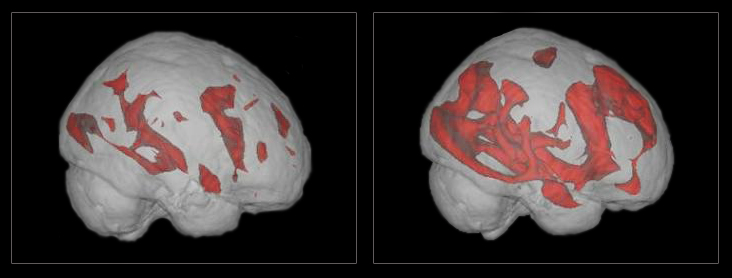
Functional MRI brain scans show how searching the Internet dramatically engages brain neural networks (in red). The image on the left displays brain activity while reading a book; the image on the right displays activity while engaging in an Internet search. (Credit: Image courtesy of University of California - Los Angeles)
UCLA scientists have found that for computer-savvy middle-aged and older adults, searching the Internet triggers key centers in the brain that control decision-making and complex reasoning. The findings demonstrate that Web search activity may help stimulate and possibly improve brain function.
The study, the first of its kind to assess the impact of Internet searching on brain performance, is currently in press at the American Journal of Geriatric Psychiatry and will appear in an upcoming issue.
Additional details on the study and further research on the impact of computer technologies on the aging brain are highlighted in Small's new book, "iBrain: Surviving the Technological Alteration of the Modern Mind". Dr. Gary Small, a professor at the Semel Institute for Neuroscience and Human Behavior at UCLA who holds UCLA's Parlow-Solomon Chair on Aging. says: "Internet searching engages complicated brain activity, which may help exercise and improve brain function".
"A simple, everyday task like searching the Web appears to enhance brain circuitry in older adults, demonstrating that our brains are sensitive and can continue to learn as we grow older," Small said.

No comments:
Post a Comment